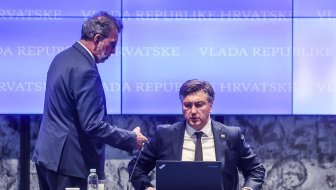Secretary of State Hillary Clinton said in Sarajevo on Tuesday the US would continue to support Bosnia and Herzegovina as one state with prospects of NATO and European Union membership, but stressed that Bosnian political leaders must take responsibility for the reforms that must lead to that.
Bosnia's future lies in the integrated Europe, Clinton said opening a new building of the US Embassy in Sarajevo in which the US invested $128 million. It is the eighth biggest US diplomatic mission in Europe.
I believe this new building represents an important symbol of the friendship between our two countries, said Clinton.
She recalled that the US has been actively present in Bosnia for 20 years, investing significant efforts to help strengthen peace and stability. She mentioned three US diplomats - Robert Frasure, Joseph Crusel and Nelson Drew - who were killed in 1995 as they were trying to enter Sarajevo, then under siege, via a mountain road, accompanied by Richard Holbrooke.
That was part of America's constant efforts to support an integral, free and safe Europe, said Clinton, adding the US had always remained committed to that goal and that it led to the signing of the Dayton agreement, which ended the war in Bosnia in 1995.
Guided by the same principle, the US continues to believe that Bosnia's future is in the heart of the integrated and democratic Europe, she said.
In order to achieve that goal, we remain committed to your membership of the EU and NATO. We also know that only the people and political leaders of this country can make that happen, said Clinton.
That calls for leadership and willingness to make compromises so that reforms can be carried out, which calls for forming the new government as soon as possible and carrying out a constitutional reform immediately after that, she said.
Clinton told Bosnian citizens as well as politicians that it was in their interest to reject the false promises of nationalist policies.
Leaders of prominent political parties who had a chance to meet Clinton during the ceremony at the embassy generally praised her address and messages, but remained divided as to reform requirements.
Social Democratic Party president Zlatko Lagumdzija told press Clinton had reaffirmed the US policy towards Bosnia and that the US clearly would not allow any secession from Bosnia.
He said there was enough strength within Bosnia to stop a possible secession if the international community did not do so first.
The Serb entity's Prime Minister, Milorad Dodik, said he was pleased with Clinton's message that agreement must be reached by domestic politicians and that the US could only help in that.
"That's a completely new situation for me, which reinforces our responsibility, primarily for dialogue and then for possible solutions as well," Dodik said, adding the Serb entity could agree only to minor constitutional amendments and that it would insist that Bosnia's two entities be given back the powers that were transferred to the state.
Dodik said he asked Clinton for the prompt closure of the Office of the High Representative (OHR), saying it was a "disruptive factor".
Party of Democratic Action leader Sulejman Tihic said one could now expect tensions to defuse, which should provide for finding a solution to existing problems.
"The US stays with us, it will help us, but we must take on the responsibility for solving problems," he said.
The president of Bosnia's Croatian Democratic Union (HDZ BiH) party, Dragan Covic, did not attend the embassy opening, while vice president Niko Lozancic said he was encouraged by suggestions that the US would firmly stand by Bosnia.
"I believe that will help Bosnia make big steps towards Euro-Atlantic integration," he said.
High Representative Valentin Inzko said in talks with Clinton the OHR should not be closed before Bosnian authorities carried out the reforms required by the international community.
Inzko believes the international community must stick to its earlier decision that the OHR should not be shut down before requirements were met, OHR said in a statement, adding that big challenges, such as the status of state property, had not been solved yet.
Inzko said Bosnian politicians must urgently carry out the reforms that would bring the country back on the road of Euro-Atlantic integration and that for that to happen, they must radically change their way of working.
Clinton also held a meeting with the three members of the state presidency, but there were no statements for the press afterwards.
During a meeting with students, Clinton said the October 3 elections would result in a new way of thinking which encouraged the solving of existing problems. She said the US was against anyone who obstructed Bosnia's progress and stability.
Hatred has subsided but nationalism has not, said Clinton.
In the afternoon, she flew to Belgrade to meet Serbia's most senior officials.



































